|
|
|
Sort Order |
|
|
|
Items / Page
|
|
|
|
|
|
|
| Srl | Item |
| 1 |
ID:
075390
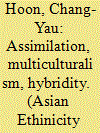

|
|
|
|
|
| Publication |
2006.
|
| Summary/Abstract |
The dominant discourse in accommodating the ethnic Chinese in Indonesia during Suharto's regime was one of assimilation, which forcefully aimed to absorb this minority into the national body. However, continuous official discrimination towards the Chinese placed them in a paradoxical position that made them an easy target of racial and class hostility. The May 1998 anti-Chinese riots proved the failure of the assmilationist policy. The process of democratization has given rise to a proliferation of identity politics in post-Suharto Indonesia. The policy of multiculturalism has been endorsed by Indonesia's current power holders as a preferred approach to rebuilding the nation, consistent with the national motto: 'Unity in Diversity'. This paper critically considers the politics of multiculturalism and its efficacy in managing cultural diversity and differences. It deploys the concept of hybridity to describe as well as analyze the complex identity politics of the ethnic Chinese in contemporary Indonesia.
|
|
|
|
|
|
|
|
|
|
|
|
|
|
|
|
| 2 |
ID:
118502
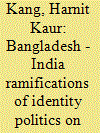

|
|
|
| 3 |
ID:
072837
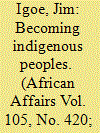

|
|
|
|
|
| Publication |
2006.
|
| Summary/Abstract |
Although the term 'indigenous' implies a state preceding that which is foreign or acquired, indigenous movements in Africa are a recent phenomenon. Drawing from the author's research of the Tanzanian indigenous peoples' movement in the 1990s, this article argues that indigenous identity in Tanzania does not represent miraculously preserved pre-colonial traditions or even a special sort of marginalization. Rather, it reflects the convergence of existing identity categories with shifting global structures of development and governance. Specifically, it reflects a combination of 'cultural distinctiveness' and effective strategies of extraversion in the context of economic and political liberalization. The Maasai, who are 'culturally distinct', and who have a long tradition of enrolling outsiders in their cause, naturally dominate this movement.
|
|
|
|
|
|
|
|
|
|
|
|
|
|
|
|
| 4 |
ID:
093965
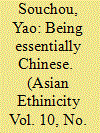

|
|
|
|
|
| Publication |
2009.
|
| Summary/Abstract |
The Postmodern view of Chinese identity, with its emphasis on self-invention and culture performance, does not gel with the real difficulties of identity formation in the real social, political world. While the approach exposes the fetishism of race, it replaces race with culture still seen in totalizing, essentialzing terms.
|
|
|
|
|
|
|
|
|
|
|
|
|
|
|
|
| 5 |
ID:
132221
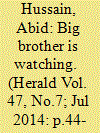

|
|
|
| 6 |
ID:
123929
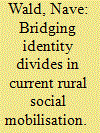

|
|
|
|
|
| Publication |
2013.
|
| Summary/Abstract |
The shift from a corporatist citizenship regime to a neoliberal one has adversely affected Latin American rural communities and led to widespread social mobilisation and organisation in the countryside. The struggle of such marginalised communities has been often framed by stressing their indigenous collective identity over the previously prevalent class-based peasant identity. This article focuses on the role of identity and the negotiation of different identities in the struggle of two rural organisations in Northwest Argentina for securing land tenure and improving their standards of living. Argentinean society, in contrast to some other Latin American societies, is often imagined as 'white,' but in recent decades many peasant, or campesino, communities have rediscovered or reaffirmed their indigenous origin. This article therefore deconstructs rural collective identities in Argentina and analyses how class and ethnic identities are negotiated in struggles of grassroots social organisations in the countryside of this predominantly urban country.
|
|
|
|
|
|
|
|
|
|
|
|
|
|
|
|
| 7 |
ID:
156298
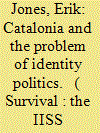

|
|
|
|
|
| Summary/Abstract |
The 1 October Catalan referendum on independence was a trap for Madrid. Spain’s political leaders were bound to be criticised whether they ignored the vote or tried to stop it. Shunting responsibility for dealing with the crisis onto the courts and the police was no way out. The voters in Catalonia know that. Now the Spanish government will be held to account. Political leaders everywhere should pay attention.
|
|
|
|
|
|
|
|
|
|
|
|
|
|
|
|
| 8 |
ID:
105300
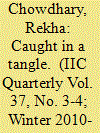

|
|
|
| 9 |
ID:
164970
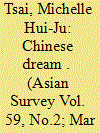

|
|
|
|
|
| Summary/Abstract |
Starting from Xi Jinping’s political initiative the Chinese Dream, this paper examines its capitalist and nationalist discourse constructed through the nation’s disciplinary system, and seeks to unravel how it is enmeshed with business operations in mainland China. The paper argues that Taiwanese businesspersons play an ambiguous role in the dream as both “foreign” and “Chinese” investors.
|
|
|
|
|
|
|
|
|
|
|
|
|
|
|
|
| 10 |
ID:
154719
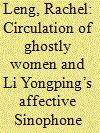

|
|
|
|
|
| Summary/Abstract |
Li Yongping’s writing displays an acute sensitivity to the changing cultural and historical positioning of the Sinophone Malaysian (Mahua) community and his own migratory experiences. This article focuses on Li’s incessant engagement with issues of gender and feminine sexuality in relation to the shifting biopolitical construction of a hybrid Sinophone Malaysian identity. Through an analysis of Li Yongping’s short story collection, The Snow Falls in Clouds (2002), I aim to examine how he deploys the trope of a prostitute figure to evoke the complexities of a Sinophone Malaysian identity and identification as a consistently reinvented affective product. Li’s keen awareness of the trafficking of desirable Chinese female bodies in Southeast Asia is inextricable from Sinophone Malaysia’s cultural history and community formation. Spectral feminine images reflect the increasingly porous and deterritorialized boundaries of citizenship, community, and nationalism complicating the concept of “Chineseness” and an affective Sinophone Malaysian subjectivity.
|
|
|
|
|
|
|
|
|
|
|
|
|
|
|
|
| 11 |
ID:
139442
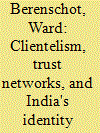

|
|
|
|
|
| Summary/Abstract |
With an election campaign for a seat in Gujarat's state parliament as its backdrop, this article relates India's persistent forms of identity politics to the evolution of trust networks. Political scientists and anthropologists have adopted highly divergent approaches to account for the ways in which India's politicians use social identities to mobilize support. A point of convergence, this article argues, lies in the social networks through which people solve everyday problems and organize access to state resources. Discussing the ever-changing salience of social divisions in Gujarat's politics – from class to caste to religion and region – this article argues that two characteristics of such trust networks – the extent to which these networks are organized along social divides and the extent to which they lend themselves to facilitating clientelistic exchanges with politicians – can foster or impede the political salience of these social divisions. The particular historical development of trust networks and their entanglement in patronage networks impacts the likelihood of the emergence of divisive political discourse.
|
|
|
|
|
|
|
|
|
|
|
|
|
|
|
|
| 12 |
ID:
118357
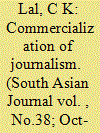

|
|
|
| 13 |
ID:
133425
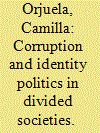

|
|
|
|
|
| Publication |
2014.
|
| Summary/Abstract |
Corruption is a major problem for populations in various parts of the world. This article argues that to understand the problems and dynamics of corruption, we need to understand how discourses and practices of corruption (and anti-corruption efforts) are intertwined with the construction and contestations of identity. Identity politics is a salient feature in peaceful political struggles, as well as in contemporary armed conflicts, which are often characterised by the politicisation of collective identity (ethnic, national, religious) for the violent pursuit of power. The article outlines and discusses four ways in which identity politics and corruption intersect. First, it points to the often blurred lines between private and collective benefit from corruption, revealing the implications of group identity for how corruption is conceptualised. Second, it shows how corruption may exacerbate grievances along identity lines. Third, it highlights how corruption can be used strategically in identity-based conflicts. Finally, it explores how corruption may encourage cross-ethnic solidarity and mobilisation that defy conflict divides.
|
|
|
|
|
|
|
|
|
|
|
|
|
|
|
|
| 14 |
ID:
117666
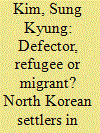

|
|
|
| 15 |
ID:
164301
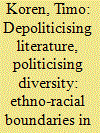

|
|
|
|
|
| Summary/Abstract |
Although still a neglected area, over the years a growing body of sociological research on the position of ethno-racial minorities in Western artistic fields has emerged. With this article we aim to contribute to this research area by focusing on ethno-racial diversity in the Dutch literary field. Through in-depth interviews, we analyse how gatekeepers mobilise specific cultural repertoires and by doing so draw ethno-racial boundaries when discussing acquisition, assessing quality and positioning themselves in the literary field. We argue that literary publishers and other professionals (selectively) employ an ‘old school’ modernist repertoire that especially values the formal aspects of literary products, by which non-white writers and publishers concerned with diversity are often positioned in an identity politics framework. Their work is said to take in a less prestigious ‘political’/’subjective’ position rather than a ‘literary’/‘universal’ one. As such, this paper informs on how gatekeepers’ practices shape the position of non-white authors in the Dutch literary field.
|
|
|
|
|
|
|
|
|
|
|
|
|
|
|
|
| 16 |
ID:
074179
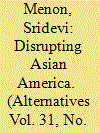

|
|
|
|
|
| Publication |
2006.
|
| Summary/Abstract |
This article elaborates a critical practice that interrogates the discursive protocols narrating the US nation's histories. It poses South Asian American genealogies as strategic sites from which the racial formation of the United States and Asian America may be explored.
|
|
|
|
|
|
|
|
|
|
|
|
|
|
|
|
| 17 |
ID:
145049
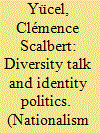

|
|
|
|
|
| Summary/Abstract |
Many concepts and notions have been used to deal with the social and political fact of difference, and diversity is the last on the list, as stated by Avana Lentin and Gavan Titley. It has been described by many as vague, ubiquitous and malleable, ambiguous, or else multifaceted. Most of the authors who have dealt critically with the topic have stressed the plasticity and ubiquity of diversity, considered at times as discourse, at others as practice or policy, and sometimes as both. But among these authors, there are numerous who have depicted the genealogy or the invention of diversity—therefore, breaking the vicious circle of the vision of a vague and ungraspable diversity.
|
|
|
|
|
|
|
|
|
|
|
|
|
|
|
|
| 18 |
ID:
145853
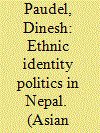

|
|
|
|
|
| Summary/Abstract |
The ethnic issue has dominated Nepal’s political landscapes since the birth of the Republic of Nepal in 2007. For decades, Nepal witnessed a series of peasant rebellions against the state and landed aristocrats. Ethnic peasants were at the forefront, demanding autonomy, dignity, and an end to state violence. Since the 1980s, however, the ‘ethnic question’ has become a development issue and the developmental idea of indigeneity has consolidated both ethnic elites and peasants. Recently, identity politics has become a dominant ideological force, rapidly unraveling the course of radical political developments in the country. Interestingly, this political movement emerged in a particular historical conjuncture where Nepali politics has been extensively shaped by the recent Maoist revolution and a long history of international development. This paper explores various aspects of ethnic peasantry and argues that the notions of indigeneity and identity politics have reinforced elite domination by depoliticizing ethnic peasant politics in Nepal.
|
|
|
|
|
|
|
|
|
|
|
|
|
|
|
|
| 19 |
ID:
072162
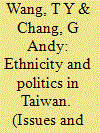

|
|
|
| 20 |
ID:
129842
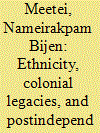

|
|
|
|
|
| Publication |
2014.
|
| Summary/Abstract |
The idea of indigenousness has been evoked to legitimize group exclusive claims including separate territories in North-East India. By analyzing experiences in Meghalaya and Manipur, the article argues that the colonial ethnic categorization that produced "ethnic conglomerates" has generated a number of problems leading to conflict in the postindependence period. First, certain composite identities have been formed by bringing together under a single umbrella a range of distinct indigenous groups' identity, often leading to the suppression of smaller identities within the larger group. Thus, the smaller groups struggle to have their own identities recognized. Furthermore, the imposed ethnic categorization has enabled the contemporary political class, which has simply perpetuated the colonial system, to use cultural identity and "indigenousness" instrumentally to their own advantage.
|
|
|
|
|
|
|
|
|
|
|
|
|
|
|
|
|
|
|
|
|